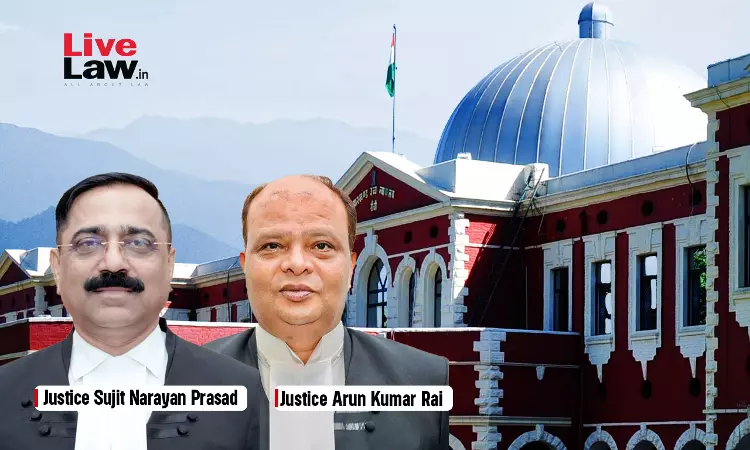Removal From Service For Procedural Lapses, Disinterest & Harassment of Subordinates, Disproportionate To Misconduct: Jharkhand HC
Namdev Singh
24 Oct 2025 10:31 AM IST

A Division bench of the Jharkhand High Court comprising Justice Sujit Narayan Prasad and Justice Arun Kumar Rai held that the capital punishment of removal from service is disproportionate to charges relating to procedural lapses, casualness in duty, lack of interest in work and harassment of subordinates.
Background Facts
The respondent joined the Bihar Education Service Class-II cadre with effect from 08.12.1988. She was appointed through the 33rd Combined Competitive Examination conducted by the Bihar Public Service Commission (BPSC). She was allotted to the Jharkhand cadre after the reorganization of the state of Bihar. The respondent was posted as the Principal of Government Girls +2 High School, Palamau, from 20.12.2004. She continued in that role until 05.07.2016. Despite her seniority, she was transferred to the post of District Education Officer (DEO), Palamau, and assumed charge on 05.07.2016.
However, she was transferred from the post of DEO, Palamau, within eight months. The petitioner contended that this transfer was neither in the public interest nor due to any administrative requirement, but was an act of unfair targeting. A departmental proceeding was initiated against her when she was serving as DEO. A memorandum of charges was issued. Various acts of misconduct were alleged like including continuous violation of procedures, promoting financial irregularities, withholding salaries of subordinates, causing delays in processing bills, and disobedience of government orders.
The charges were found to be proved after an inquiry. The disciplinary authority passed an order imposing the punishment of removal from service. Aggrieved, the respondent filed a writ petition challenging the proceedings and the penalty. The Single Judge quashed the order of removal. It was held that the punishment was disproportionate to the gravity of the charges. The court remitted the matter to the disciplinary authority to pass a fresh order after reconsidering the quantum of punishment.
Aggrieved by the same, the State preferred the Appeal.
It was contended by the appellant-State that the Writ Court failed to appreciate that the respondent was holding the pivotal post of District Education Officer, which carries significant accountability. She failed to discharge her official duties which constituted a serious breach of trust. Therefore, the punishment of removal was not disproportionate to the gravity of the proven misconduct. It was also submitted that the conclusion of the Single Judge that the nature of the charges was not proportionate to the punishment, was an erroneous application of mind.
On the other hand, it was contended by the respondent that the punishment of removal from service was shockingly disproportionate to the gravity of the charges levelled against her. The charges did not constitute grave misconduct. It was further submitted that the respondent's 31 years of unblemished service was overlooked by the disciplinary authority.
Findings of the Court
It was observed by the Court that the power of judicial review under Article 226 permits High Court to interfere with an order of punishment. It can interfere on the ground that the penalty imposed is so disproportionate to the misconduct that it shocks the conscience of the Court. It was found by the Court that the nature of the charges against the respondent relating to procedural lapses, casualness in official duties, and lack of interest, did not amount to grave misconduct.
It was held that the nature of the allegation was not so grave as to warrant the capital punishment of removal from service. Emphasis was placed on the respondent's 31 years of unblemished service. It was held that the entire service period of 31 years will not be considered even for pension or any post-retirement benefits. Further the respondent will be forced to leave service without any financial benefits.
The judgment of the Supreme Court in Union of India vs. P. Gunasekaran was relied upon wherein it was held that the High Court's power under Articles 226 and 227 in disciplinary matters is limited. It cannot reappreciate evidence or act as an appellate authority. Interference is allowed only for procedural irregularity, extraneous considerations, or findings unsupported by evidence. The adequacy or reliability of evidence cannot be questioned. Further the punishment may be interfered with only if it is shockingly disproportionate.
It was held by the Court that the Single Judge committed no error in setting aside the order of removal and conclude that the punishment imposed was disproportionate to the charge committed. With the aforesaid observations, the appeal filed by the State was dismissed by the court.
Case Name : The State of Jharkhand & Ors. vs. Meena Kumari Rai
Case No. : L.P.A.No.134 of 2025
Counsel for the Appellants : Ashutosh Anand, A.A.G.-III
Counsel for the Respondents : Rahul Kumar, Advocate
Click Here To Read/Download The Order


